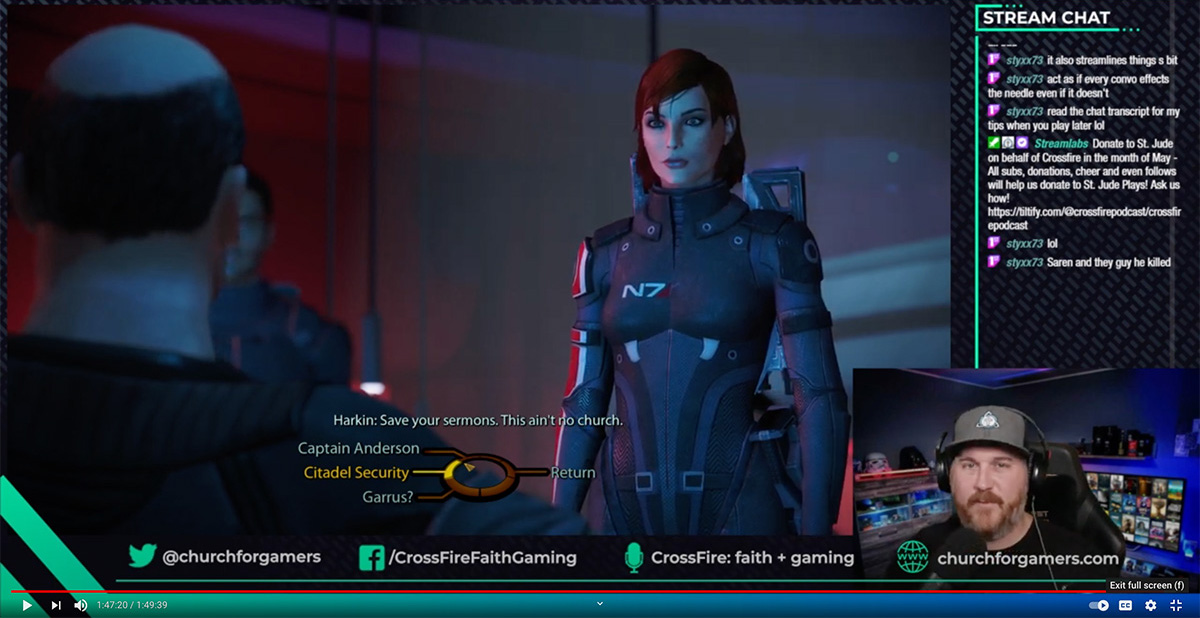주요 포인트
• 비디오 게임을 즐겨하던 한 목사가 온라인에 형성되어 있는 강력한 커뮤니티를 발견하고, 이를 사역을 위한 새로운 기회로 삼았다.
• 신앙과 인터넷 게임을 결합한 크로스파이어(CrossFire)는 종교와 관련한 토론 및 비공식 토론을 위한 커뮤니티를 구축하기 위해, 다양한 온라인 플랫폼을 활용했다.
1980년대 이후, 비디오 게임과 게이머(gamer)들에게는 많은 변화가 있었다.
팩맨과 전자오락실 그리고 지저분한 지하실에서 번쩍이는 블루스크린을 통해서 하던 비디오 게임은 이제 현대 사회에 압도적으로 시장을 확장해왔다.
현재 전자 게임은 그 크기와 범위 및 품질이 예술의 범주로 여겨질 만큼 향상되었다. 또한 사람들이 경연이나 스트리밍 환경을 이용해, 비디오 게임을 하면서 자신의 경력을 쌓을 수 있게 되었고, 이에 따라 여러 비디오 게임 커뮤니티가 등장하고 있다.
데이빗 페티 목사와 신앙과 게임을 접목한 크로스파이어(CrossFire: faith + gaming)는 이렇게 여러 커뮤니티와 게임을 하는 사람들의 연결이 거미줄처럼 사방으로 연결되어, 그 한계를 가늠하기 어려울 지경에 이른 상황을 이용해, 비디오 게임을 하는 사람들을 사역에 참여시키기 위한 새로운 영역을 개척하고 있다.
콜로라도주 콜로라도스프링스에 소재한 세인트폴 연합감리교회의 담임인 페티 목사는 2017년부터 이 사역을 시작했다.
 연합감리교뉴스의 주간 e-뉴스레터인 <두루알리미>를 받아보시려면, 지금 신청하세요.
연합감리교뉴스의 주간 e-뉴스레터인 <두루알리미>를 받아보시려면, 지금 신청하세요.
“어린 시절부터 게임을 좋아했어요. 어른이 된 저는 종종 게임으로 시간을 낭비한단 말을 듣곤 했는데, 그 외의 다른 ‘여가 생활’을 시간 낭비라고 말하지는 않더라고요. 결국 관점에 따라 모든 것이 달라진다는 것을 깨달았죠.”라고 그는 말했다.
이러한 관점은 그를 어떻게 사람들이 모여 공통의 관심사를 중심으로 그룹을 만들고, 유대를 형성하는지 탐구하게 만들었다. 그리고 그것은 교회가 게이머들로부터 배워야 한다는 예상치 못한 통찰력으로 그를 이끌었다.
“나는 많은 게임 커뮤니티가 내가 알아 왔던 일부 교회들보다 더 강한 공동체 의식을 가진 것을 발견했다.”라고 그는 말했다.
그 후 페티 목사는 게이머를 위한 교회가 존재할 수 있는지 여부를 고려하기 시작했다. 그는 자신의 아이디어를 나누고, 그것을 시도하고자 하는 사람들과 그룹을 만들었다. 그리고 마침내 이 그룹은 그가 꿈꿨던 대로 게이머들을 위한 교회가 되었다.
크로스파이어는 페티 목사가 다양한 디지털 공간 속에 존재하는 서로 죽이 잘 맞는 그룹을 부를 때 쓰는 이름이다. 이 사역은 커뮤니티를 구축하는 페이스북(Facebook)과 음성 채팅으로 특화된 플랫폼인 디스코드(Discord) 그리고 게임을 실시간으로 중계하며, 방문자들과 대화하고 자선 단체를 위해 모금 활동까지 할 수 있는 트위치(Twitch)에 이르기까지, 자신들을 필요로 하는 사람들에게 다가가기 위한 다양한 통로를 활용한다.
교회와 게임 분야 모두의 의견을 수렴할 수 있는 팟캐스트(podcast)도 있다. 팟캐스트 공동 진행자인 페티 목사와 자신의 아내가 연합감리교회 목사인 러스 도니쉬는 건강한 게임 습관과 육아 그리고 사회 정의와 같은 주제에 대한 대화를 나누었다. 이들은 또한 올해 들어 사순절 묵상 시리즈도 대화의 주제에 포함시켰다.
페티 목사는 온라인으로 신학적인 토론을 하거나, 기도를 요청하거나 또는 어려운 시기를 이겨내기 위해 서로를 위로하기도 하지만, 신앙이나 영성에 대한 구체적인 언급을 하지 않고, 단지 게임이나 만화를 소재로 한 마블(Marvel) 영화에 관해 이야기할 때도 있다고 말했다. 이는 그가 의도한 것으로, 그는 토론의 내용보다 관계가 더 중요하다고 믿기 때문이다.
“교회 개척 성공은 가장 매력적인 (교단) 로고나 청중을 휘어잡는 설교자를 통해서가 아니다. 그것은 공동의 목표를 가진 사람들을 중심으로, 실질적이고 진정성 있는 커뮤니티를 만들 수 있을 때 가능하다.”라고 그는 말했다.
“나는 한 번도 영향력 있는 소셜미디어의 인플루언서가 되고자 한 적이 없다. 나는 사람들이 그들의 믿음과 게임에 대한 사랑이라는 공통된 관심사를 중심으로 서로 연결되는 것을 보고 싶었을 뿐이다.”
라니 'Styxx' 화이트는 크로스파이어를 이렇게 설명했다.
“더 라스트 오브 어스(The Last of Us) 또는 매스 이펙트(Mass Effect)의 더 깊은 주제들에 대해 논의할 수 있는 장소이자, 용서가 영혼에 얼마나 좋은지를 토론하고, 지금과 같은 디지털 시대에 기독교인이 된다는 것의 의미가 무엇인지를 탐구할 수 있는 곳이다.”
"크로스파이어는 내가 괴짜 게이머이자 기독교인으로서 인정받을 수 있게 해주었다."라고 화이트는 말했다.
2020년 코로나19 확산으로, 많은 공동체 내의 사역을 위한 물리적 공간의 사용이 불가능해지거나 접근이 어려워졌다. 그러나 이런 시기에 크로스파이어는 디지털 공간을 활용하여 사역을 확장하고, 사역이 정말로 필요한 사람들의 공감을 얻어냈다.
페티 목사는 연합감리교 공보부에 보낸 기고문에 이렇게 썼다.
“온라인 교회가 '유용한'지에 대한 오랜 논쟁은 이미 끝났다. 온라인 교회는 안전이 보장된 유일한 사역 방법이었다.”
페티 목사에게는 이미 많은 성공 사례가 있다.
한번은 한 청소년 부모로부터 연락을 받았다. 그들은 코로나 대유행으로 인해, 자녀들이 친구를 사귀기 매우 힘들어했다고 말하며, 크로스파이어의 회원이 되어 자녀가 안전한 커뮤니티의 일부가 되고, 다른 사람들과 연결될 수 있었던 중요한 방법이었다는 데 의견을 같이했다.
또 다른 사례는 한 여성이 어느 월요일 밤에 불쑥 디스코드 커뮤니티에 들렀던 일이다. 그녀는 신앙을 포함해, 개인적인 삶의 문제로 고민하며 고통받고 있었다. 크로스파이어는 그녀와 이야기하며, 그녀를 도울 수 있는 커뮤니티가 있다는 사실과 그녀 삶의 여정에 함께할 수 있는 커뮤니티가 있음을 알려주었다.
페티 목사는 기독교인이면서 동시에 비디오 게임을 할 수 있다는 사실에 놀랐다는 사람들을 종종 만난다. 비디오 게임이 지난 수십 년 동안 엄청나게 성장했음에도 불구하고, 아직도 존재하는 하나님을 사랑하면서 게임도 사랑하는 어린이와 성인을 둘러싼 게이머에 관한 낙인이 사라지기를 크로스파이어는 소망하고 있다.
크로스파이어의 일원인 브라이언 'R3d Letter' 휴즈는 "게이머들은 자신이 존재하는 곳에서 사람을 만날 수 있는 교회의 능력을 손상시킨다는 커다란 인구통계학적 오해를 받고 있다. 크로스파이어는 자신의 하나님에 대한 사랑과 게임에 대한 사랑을 공유하는 사람들과 함께 커뮤니티를 형성할 수 있는 몇 안 되는 온라인 장소 가운데 한군데다.”라고 말했다.
휴즈는 사람들이 다시 대면으로 되돌아간다고 할지라도, 온라인 사역이 계속해서 성장할 것으로 기대하고 있다. 그는 크로스파이어가 "대유행 이전에 이미 실행 가능한 사역"이었고, 세상이 과거의 “노말 시대”로 회귀하더라도 변하지 않을 것이라고 말했다.
페티 목사는 이렇게 말했다.
"우리는 크로스파이어가 모든 분야에 연대, 사명, 헌신을 위한 기회를 제공하는 훌륭한 커뮤니티가 될 수 있도록 끊임없이 노력하고 있다. 이 사역은 누구에게나 열려 있다. 우리 모두 이곳에서 안정을 취할 수 있다.”
크로스는 노스다코다주의 파고에 거주하는 자유기고가이다. 연합감리교뉴스에 연락 또는 문의를 원하시면 김응선 목사에게 tkim@umnews.org로 이메일을 보내거나 615-742-5109로 연락하시기 바랍니다. 연합감리교뉴스를 더 읽기 원하시면, 주간 e-뉴스레터인 두루알리미를 신청하세요.




